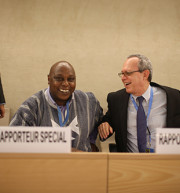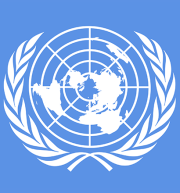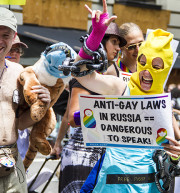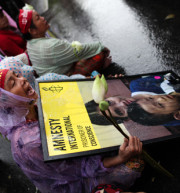
Issue No. 6 of the Assembly and Association Briefing, the newsletter of Maina Kiai, UN Special Rapporteur on the rights to freedom of peaceful assembly and of association. In this issue: • Special Rapporteur prepares to tackle multilateral institutions in October 2014 report • “Kiai Comments” – a new way to support assembly and association rights on your website • Special Rapporteur: Targeting at-risk groups a reprehensible “divide and conquer” technique • Egypt: UN Experts “outraged” at confirmation of 183 death sentences • Maina Kiai in Burundi on unofficial academic visit • Kiai blasts UN-Kenya for favoring ‘stability’ over rights • Freedom of association and assembly: By the numbers • Special rapporteur news in brief: June and July 2014 • World briefing: Freedom of assembly and association in the news For a link to the newsletter, click on the image at right or click here (1.4 MB file) or here (7.8 MB full resolution file). To subscribe to our newsletter, please drop us a line at info@freeassembly.net with the subject line “subscribe to newsletter.” For other recent newsletters, see the links below: The Assembly and Association Briefing, Vol. 1, Issue 3 (April 2014) The Assembly and Association Briefing, Vol. 1, Issue 4 (May 2014) The Assembly... Continue reading →

UN Special Rapporteur Maina Kiai has authored a commentary for the International Service for Human Rights, in which he blasts the practice of targeting of groups “most at-risk” who seek to exercise their assembly and association rights. The plight of at-risk groups was the subject of a report Kiai presented to the UN Human Rights Council on June 10, 2014. The label 'most at risk' refers to the heightened occurrence of attacks and reprisals against these groups Kiai notes in article that it is hard to define exactly what “at risk” means. “It’s a moving target,” he writes. “Today it could be an obscure classification, based on religion, ethnicity, disability or sexual orientation. Tomorrow it could be broader – young or old, male or female. The next day it could be you.” “Indeed, somewhat paradoxically, every single person reading this article will have fallen into one of the report’s at-risk groups at some point in their lives,” he adds. Kiai argues that the rationale for targeting marginalized groups invariably comes back to fear. For governments, this can be fear of seeing their authority undermined. But for ordinary people it usually comes down to fear of the unknown. “Unfortunately, many governments are all too happy to leverage this fear for their own... Continue reading →

GENEVA – Special Rapporteur Maina Kiai today urged UN member states to protect the assembly and association rights of all people within their borders – including those who are “seen as being different” and may be marginalized as a result. Kiai’s remarks were delivered to the Human Rights Council on June 10-11 in Geneva, where he presented three reports – a thematic report on the assembly and association rights of groups “most at risk,” a country report on his official mission to Rwanda, and third on communications transmitted to UN Member States. The Special Rapporteur’s most recent thematic report documents the challenges faced by marginalized groups in exercising – or seeking to exercise – their rights to freedoms of peaceful assembly and of association. These groups, deemed “most at risk,” include persons with disabilities; youth; women; lesbian, gay, bisexual, transgender and intersex (LGBTI) people; members of minority groups; indigenous peoples; internally displaced persons; and non-nationals, including refugees, asylum seekers and migrant workers. “It matters not whether we approve or support the activities of these marginalized groups at risk,” Kiai told the Council. “The test of international law is that as long as their activities are non-violent,... Continue reading →

GENEVA – United Nations Special Rapporteur Maina Kiai will appear before the 26th Session of the UN Human Rights Council on June 10 to present his latest reports – one on his official mission to Rwanda and another focusing on the assembly and association rights of marginalized groups. He will also present a third report on observations on communications transmitted to Governments and replies received between March 1, 2013, and February 28, 2014. Kiai, who is the UN Special Rapporteur on the rights to freedom of peaceful assembly and of association, is scheduled to present at the Council’s afternoon session on June 10, which begins at 12:30 p.m. local time; his presentation may run into June 11, depending on the length of other agenda items. The session will be broadcast live on http://webtv.un.org/. Thematic Report: Groups Most At Risk Kiai’s thematic report documents the challenges faced by marginalized groups in exercising – or seeking to exercise – their rights to freedoms of peaceful assembly and of association. These groups, deemed “most at risk,” include persons with disabilities; youth; women; lesbian, gay, bisexual, transgender and intersex (LGBTI) people; members of minority groups; indigenous peoples; internally displaced persons; and non-nationals, including refugees,... Continue reading →

Issue No. 4 of the Assembly and Association Briefing, the newsletter of Maina Kiai, UN Special Rapporteur on the rights to freedom of peaceful assembly and of association. In this issue: • UN Releases Special Rapporteur Kiai’s latest report on groups ‘most at risk’ • Kiai joins UN experts in urging Azerbaijan to drop charges against human rights defenders • OSCE civil society says ‘political will’ a major obstacle in protecting right to funding • Three years after Tunisia: Thoughts on the rights to freedom of assembly and association from Maina Kiai • Narrowing space in Canada: A video from Maina Kiai • Freedom of association and assembly: By the numbers • Special rapporteur news in brief: April and May 2014 • World briefing: Freedom of assembly and association in the news For a link to the newsletter, click on the image at right or click here (1 MB file) or here (5.3 MB full resolution file). To subscribe to our newsletter, please drop us a line at info@freeassembly.net with the subject line “subscribe to newsletter.” For other recent newsletters, see the links below: The Assembly and Association Briefing, Vol. 1, Issue 1 (Jan. 2014) The Assembly and Association Briefing, Vol. 1, Issue 2 (Feb-March 2014) The Assembly and... Continue reading →

The United Nations has publicly released Special Rapporteur Maina Kiai’s third thematic report to the Human Rights Council, in advance of Kiai’s presentation of the report to the Council in June. The report focuses on the challenges facing those most “at risk” when exercising their rights to freedom of peaceful of assembly and of association. This category includes individuals and groups that are often relegated to the margins of society, both in their daily lives and in the exercise of their rights. Some of the groups considered in the report include persons with disabilities; youth, including children; women; lesbian, gay, bisexual, transgender and intersex (LGBTI) people; members of minority groups; indigenous peoples; internally displaced persons; and non-nationals, including refugees, asylum seekers and migrant workers. “Two thousand fourteen is shaping up to be the year of the protest, with the news dominated by stories of mass demonstrations in Ukraine, Venezuela and elsewhere,” said Kiai, who recently began his second three-year term as Special Rapporteur on the rights to freedom of peaceful assembly and of association. “But the crackdown on assembly and association rights extends far beyond what we see in the headlines.” “Those at the margins of society face vicious... Continue reading →

Backlash from the Arab Spring of early 2011 continues to be felt globally, with space for civil society actors increasingly shrinking. In recent years many States have responded to people’s assertions of peaceful dissent by violently clamping down on peaceful protests and other forms of assembly, unduly restricting the ability of associations to form and operate, and physically assaulting civil society actors. While those actions have negatively affected all who exercise their rights to peacefully assemble and freely associate, certain groups are at particular risk of having their space all but vanish. In this report, UN Special Rapporteur Maina Kiai focuses on the challenges facing groups that are often relegated to the margins of society, both in their daily lives and in the exercise of their rights to freedom of peaceful assembly and of association. He hopes to cast the spotlight on the ways in which the denial of the rights to freedom of peaceful assembly and of association leads to the marginalization of those groups and how marginalization exacerbates their inability to effectively exercise their rights. Some of the groups that are considered in the present report to be most at risk are persons with disabilities; youth, including children; women; lesbian, gay, bisexual, transgender and intersex... Continue reading →

UN Special Rapporteur Maina Kiai convened an expert consultation in Geneva on December 9 to help shape the parameters of his next thematic report, which will be presented to the Human Rights Council in June 2014. The thematic report will focus on how laws and practices may discriminate against and exclude certain groups when exercising or seeking to exercise their rights to freedom of peaceful assembly and of association. The Geneva consultation was organized to focus on problems faced by specific groups that the Special Rapporteur and his team had identified as frequently at risk, including youth, women, LGBT individuals, indigenous peoples, minorities, refugees, migrants and other non-nationals/stateless persons, and persons with disabilities. This is, of course, a non-exhaustive list. As one of the participants in our consultation pointed out, all of us can face heightened risks in certain circumstances (as Kiai’s latest thematic report on elections makes clear). As the consultation participants shared their stories and expertise, however, it became clear that most groups face similar types of threats – at least broadly speaking – despite coming from different countries and advocating for different issues. These threats can be categorized, and given the large and diverse number of groups... Continue reading →

Six women working on women’s issues in Pakistan are killed in an ambush. A workshop for LGBT human rights defenders is disrupted by authorities in Uganda. Indigenous leaders in the Philippines are subject to a wave of harassment, threats and killings. Thirteen women in Cambodia are imprisoned for defending their community against corporate land-grabbing. And four migrant bus drivers in Singapore are charged with inciting an illegal strike. Exercising the rights to freedom of peaceful assembly and association can be dangerous for anyone, anywhere in the world. But sometimes – and in some places – the danger is elevated for certain groups. Maina Kiai’s next report as Special Rapporteur is expected to focus on exactly this subject: groups most at risk of attacks and reprisals when exercising their assembly and association rights. Kiai and his team are currently in the process of researching the report. As we begin work on the report, we would like to hear your views. Thus far, we have identified several groups as high-risk: women, youth, LGBT individuals, indigenous peoples, members of minority groups, persons with disabilities, migrants, and activists working for economic and social rights. Among these groups, which ones are most at risk in your country and for what reasons? What are... Continue reading →

On September 27, 2012, the UN Human Rights Council adopted an important resolution that will help bring protections for the freedoms of peaceful assembly and of association into the 21st century. The resolution on “the rights to freedom of peaceful assembly and of association” (A/HRC/RES/21/16) reiterates "the important role of new information and communications technologies in enabling and facilitating the enjoyment of the rights to freedom of peaceful assembly and of association." It also stresses the importance of States promoting and facilitating access to the Internet. The resolution also "reminds States of their obligation to respect and fully protect the rights of all individuals to assemble peacefully and associate freely, online as well as offline." It goes on to stress the importance of safeguarding these rights in the context of elections, and for groups most at risk. "It is critical that the online environment be recognized as an important arena for people to exercising their assembly and association rights," said Maina Kiai, UN Special Rapporteur on the rights to peaceful assembly and of association. "The Internet, for example, is not just a means for people to assembly and associate in the real world - it is a place of assembly and association itself." In his 2012 report to the... Continue reading →